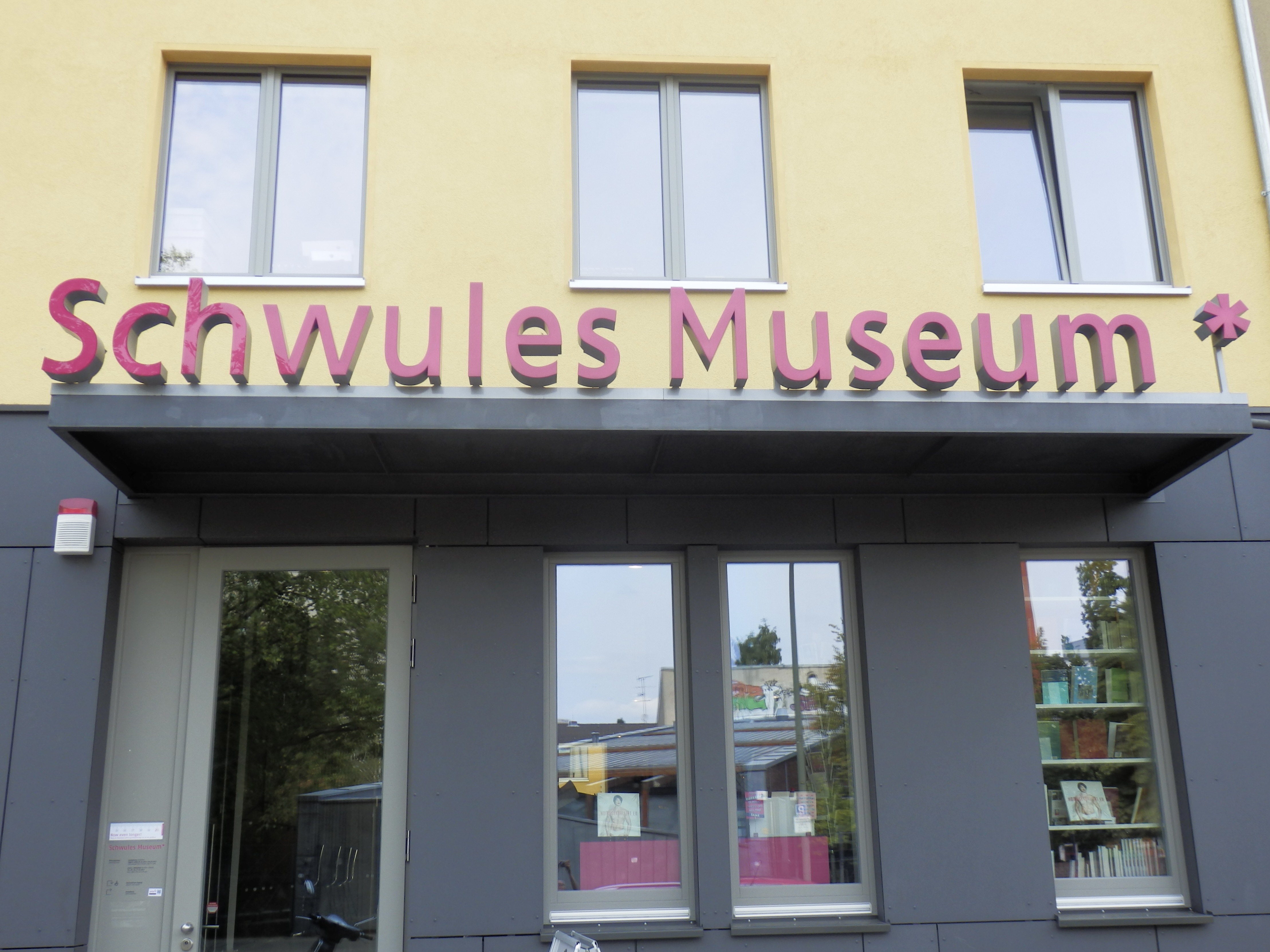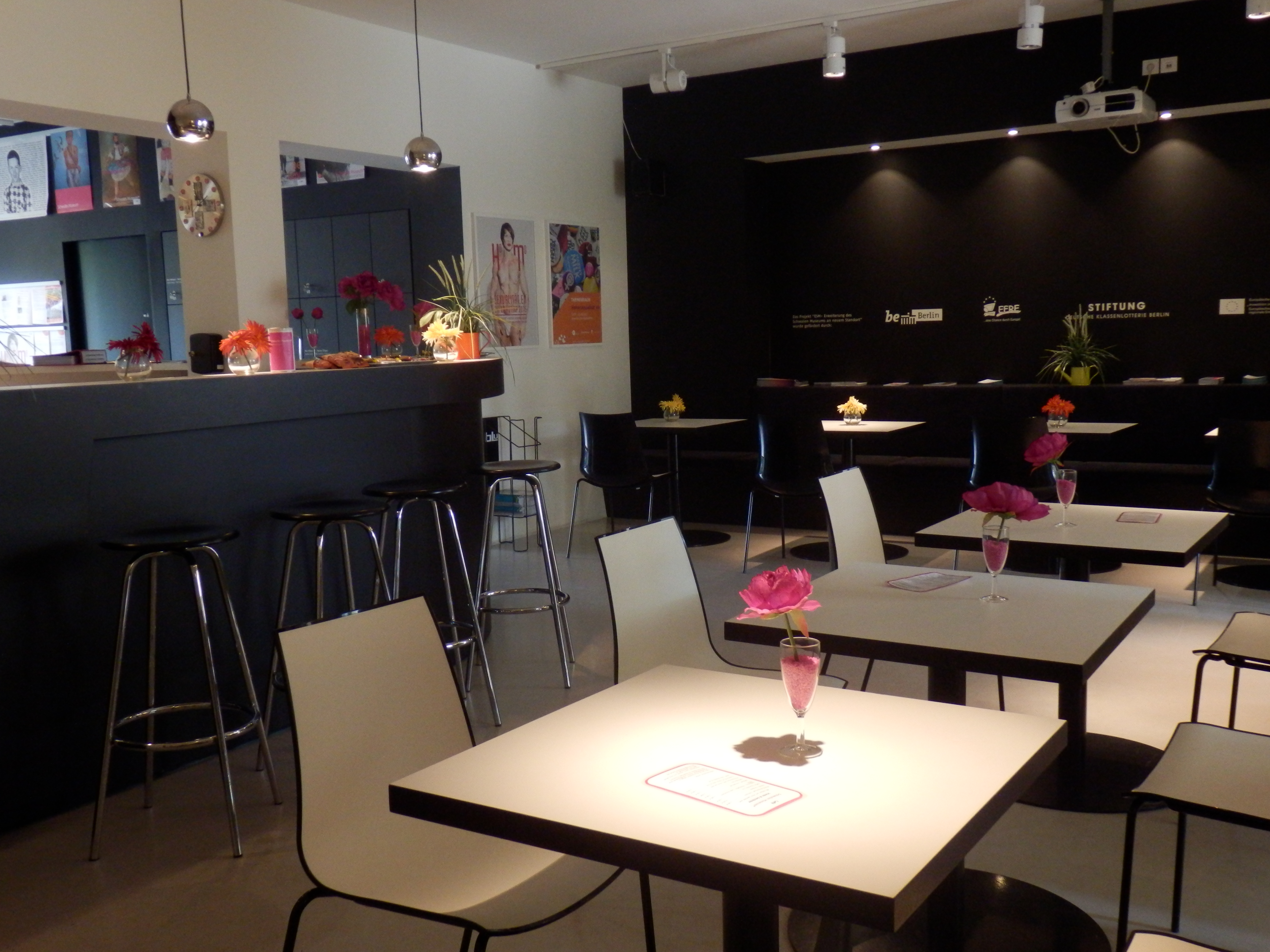Schwules Museum on:
[Wikipedia]
[Google]
[Amazon]
 The Schwules Museum (English: Gay Museum) in
The Schwules Museum (English: Gay Museum) in

 The museum was first located at
The museum was first located at
Schwules Museum website
(in English)
Visit Berlin. Schwules Museum
(in English) {{Authority control LGBT history in Germany LGBT museums and archives Museums in Berlin LGBT organisations in Germany LGBT culture in Germany Tourist attractions in Berlin Sex museums in Germany
Berlin
Berlin ( , ) is the capital and List of cities in Germany by population, largest city of Germany by both area and population. Its 3.7 million inhabitants make it the European Union's List of cities in the European Union by population within ci ...
, Germany
Germany,, officially the Federal Republic of Germany, is a country in Central Europe. It is the second most populous country in Europe after Russia, and the most populous member state of the European Union. Germany is situated betwe ...
, is a museum and research centre with collections focusing on LGBTQ+ history and culture. It opened in 1985 and it was the first museum in the world dedicated to gay history.
The museum archive holds periodicals dating from 1896 and a collection of photographs, videos, films, sound recordings, autographs, art works, and ephemera. Its library holds approximately 20,000 books on homosexuality.
Location
Mehringdamm
The Mehringdamm is a street in southern Kreuzberg, Berlin. In the north it starts at Mehringbrücke and ends - with its southernmost houses already belonging to Tempelhof locality - on Platz der Luftbrücke. It is the historical southbound Berlin- ...
61 in Kreuzberg
Kreuzberg () is a district of Berlin, Germany. It is part of the Friedrichshain-Kreuzberg borough located south of Mitte. During the Cold War era, it was one of the poorest areas of West Berlin, but since German reunification in 1990 it ha ...
when it was founded in 1985, and since the summer of 2013, it has been located in a former printing factory (1,600 m2) at Lützowstraße 73 in Berlin-Mitte
Mitte () (German for "middle" or "center") is a central locality () of Berlin in the eponymous district () of Mitte. Until 2001, it was itself an autonomous district.
Mitte proper comprises the historic center of Alt-Berlin centered on the ch ...
, more than doubling its exhibition space.
History and mission
The impetus for the founding of the Schwules Museum was a successful exhibition ongay
''Gay'' is a term that primarily refers to a homosexual person or the trait of being homosexual. The term originally meant 'carefree', 'cheerful', or 'bright and showy'.
While scant usage referring to male homosexuality dates to the late 1 ...
topics at the Berlin Märkisches Museum in summer 1984, called ''"Eldorado
El Dorado (, ; Spanish for "the golden"), originally ''El Hombre Dorado'' ("The Golden Man") or ''El Rey Dorado'' ("The Golden King"), was the term used by the Spanish in the 16th century to describe a mythical tribal chief (''zipa'') or king o ...
- Homosexual Women and Men in Berlin 1850-1950"''. It was the first public exhibition shown in Germany of recent research on gay life. In 1985 the ''Verein der Freunde eines Schwulen Museums in Berlin e.V.'' (Society of Friends of a Gay Museum in Berlin) was founded and opened its own museum dedicated exclusively to LGBTQ+ topics at Mehringdamm 61 in the district of Kreuzberg. The building acquired the nickname ''Homo-Hof'' ("the gay courtyard") because it also housed the gay nightclub ''SchwuZ'', a gay-friendly café and the , a support group which campaigns for LGBTQ+ rights.
In December 2009, the museum received its first allocation of public money, a two-year grant from the cultural funds of the Berlin Senate
The Senate of Berlin (german: Berliner Senat) is the executive body governing the city of Berlin, which at the same time is a state of Germany. According to the the Senate consists of the Governing Mayor of Berlin and up to ten senators appoint ...
. This was used to broaden its focus to encompass other minority sexual identities besides male homosexuality
Human male sexuality encompasses a wide variety of feelings and behaviors. Men's feelings of attraction may be caused by various physical and social traits of their potential partner. Men's sexual behavior can be affected by many factors, incl ...
, mainly to put more emphasis on lesbian and transgender
A transgender (often abbreviated as trans) person is someone whose gender identity or gender expression does not correspond with their sex assigned at birth. Many transgender people experience dysphoria, which they seek to alleviate through ...
people.
Exhibitions
The museum shows several temporary exhibitions every year. These include historical exhibitions illuminating particular periods or historical developments, such as: * 1997 - ''Goodbye to Berlin.100 Jahre Schwulenbewegung'' ("Goodbye to Berlin: 100 Years of the Gay Rights Movement") * 2000 - ''Verfolgung homosexueller Männer in Berlin 1933–45'' ("Persecution of Homosexual Men in Berlin 1933–45"), in collaboration with theSachsenhausen concentration camp
Sachsenhausen () or Sachsenhausen-Oranienburg was a German Nazi concentration camp in Oranienburg, Germany, used from 1936 until April 1945, shortly before the defeat of Nazi Germany in May later that year. It mainly held political prisoner ...
memorial, which dealt with the persecution of homosexuals in Nazi Germany and the Holocaust
Before 1933, homosexual acts were illegal in Germany under Paragraph 175 of the German Criminal Code. The law was not consistently enforced, however, and a thriving gay culture existed in German cities. After the Nazi takeover in 1933, the ...
.
* 2015 - ''Homosexuality_ies'', an exhibition jointly presented by the Schwules Museum and the German Historical Museum
The German Historical Museum (german: Deutsches Historisches Museum), known by the acronym DHM, is a museum in Berlin, Germany devoted to German history. It describes itself as a place of "enlightenment and understanding of the shared history ...
which was funded by the and the . It displayed a wide range of material on the history, politics and culture of homosexuality.
From December 2004 to May 2013, there was a permanent exhibition called ''Selbstbewusstsein und Beharrlichkeit. 200 Jahre schwule Geschichte'' ("Self-Awareness and Endurance: 200 Years of Gay History"). It covers period 1790 to 1990, showing how gay people met up with each other and organised networks, and depicted the strategies, options and problems of gay people in seeking to live a self-determined life. In association with this theme, the social and legal background was presented, such as the anti-gay Paragraph 175
Paragraph 175 (known formally a§175 StGB also known as Section 175 in English) was a provision of the German Criminal Code from 15 May 1871 to 10 March 1994. It made homosexual acts between males a crime, and in early revisions the provisio ...
of the German penal code; the associated marginalisation, persecution and criminalisation of homosexuality; as well as the successes of LGBT social movements
Lesbian, gay, bisexual, and transgender (LGBT) movements are social movements that advocate for LGBT people in society. Some focus on equal rights, such as the ongoing movement for same-sex marriage, while others focus on liberation, as in the ...
.
The museum also holds series of exhibitions on individuals, groups and organisations, such as ''Der Kreis
(, ''The Circle'') was a Swiss gay magazine that was published from 1932 to 1967 and distributed internationally.
History
was first published on January 1, 1932, under the original title (''Friendship Banner'') as a joint project of Laura Th ...
'' ("The Circle") and ''Gesellschaft für Reform des Sexualrechts'' ("Society for the Reform of Sexual Law"). A continuing series of homages to LGBT people in public life has included Oscar Wilde, Marlene Dietrich
Marie Magdalene "Marlene" DietrichBorn as Maria Magdalena, not Marie Magdalene, according to Dietrich's biography by her daughter, Maria Riva ; however Dietrich's biography by Charlotte Chandler cites "Marie Magdalene" as her birth name . (, ; ...
, Rainer Werner Fassbinder
Rainer Werner Fassbinder (; 31 May 1945 – 10 June 1982), sometimes credited as R. W. Fassbinder, was a German filmmaker. He is widely regarded as one of the major figures and catalysts of the New German Cinema movement.
Fassbinder's main ...
, Michel Foucault and Thomas Mann
Paul Thomas Mann ( , ; ; 6 June 1875 – 12 August 1955) was a German novelist, short story writer, social critic, philanthropist, essayist, and the 1929 Nobel Prize in Literature laureate. His highly symbolic and ironic epic novels and novell ...
.
Bibliography
* Bollé, Michael (ed.) (1984) ''Eldorado: Homosexuelle Frauen und Männer in Berlin, 1850–1950: Geschichte, Alltag und Kultur''. Berlin: Frölich und Kaufmann, 1984. . 2nd ed. (1992) Berlin: Verein der Freunde eines Schwulen Museums in Berlin e.V. .See also
*Centrum Schwule Geschichte
Centrum Schwule Geschichte e. V. (meaning: ''Gay History Centre''), abbreviated CSG, is a German "LGBT" organization based in Cologne (Köln).
CSG maintains a publicly open library and archive, both relating to the history of homosexuality and a ...
(Cologne)
* GLBT Historical Society (San Francisco)
* ONE National Gay & Lesbian Archives
ONE National Gay and Lesbian Archives at the University of Southern California Libraries is the oldest existing lesbian, gay, bisexual, and transgender (LGBT) organization in the United States and one of the largest repositories of LGBT materials ...
(Los Angeles)
* IHLIA LGBT Heritage
IHLIA LGBT Heritage, formerly known as the International Gay/Lesbian Information Center and Archive ( nl, Internationaal Homo/Lesbisch Informatiecentrum en Archief; IHLIA), is an international archive and documentation center on homosexuality, bi ...
References
External links
Schwules Museum website
(in English)
Visit Berlin. Schwules Museum
(in English) {{Authority control LGBT history in Germany LGBT museums and archives Museums in Berlin LGBT organisations in Germany LGBT culture in Germany Tourist attractions in Berlin Sex museums in Germany